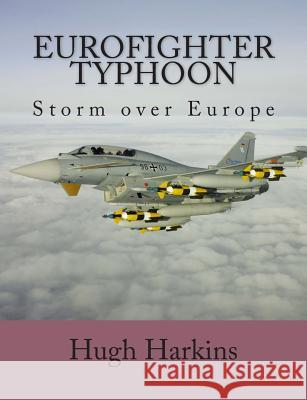Eurofighter Typhoon: Storm Over Europe » książka
Eurofighter Typhoon: Storm Over Europe
ISBN-13: 9781903630334 / Angielski / Miękka / 2013 / 150 str.
All technical data in this volume has been written from information received from the manufacturers records for this and a previous volume for which thanks go to BAE SYSTEMS, EADS Germany and its forebear MBB, CASA, Eurofighter GmbH, Eurojet and ITP Sener; the later providing details of EJ200 thrust-vectoring developments. Not since the legendary R.J Mitchell's Supermarine Spitfire of the 1930's or the ill fated BAC TSR-2 of the 1960's has a military aircraft been so much in the Spotlight as Eurofighter Typhoon under its many guises over the last three-decades. Designed primarily as a multi-role fighter to replace a number of combat aircraft types in the air forces of Germany, Italy, Spain and the United Kingdom, Typhoon has metamorphosed into a world-leading combat aircraft capable of meeting any current or near term adversary. While the initial production batches were delivered with an air combat capability the aircraft was cleared as multi-role capable by the RAF in 2008. Full operational capability scheduled for introduction with Tranche 3 will enable Typhoon to perform the full-spectrum of air to air and air to surface mission. Conceived in the 1980's, Eurofighter was designed to Cold War requirements, but emerged into a completely different military political environment that followed the collapse of the Soviet Union in 1992. The flexibility of the concept allowed the aircraft to absorb the changing military requirements resulting in an aircraft ideally suited to the missions for which it is being procured. The program has been dogged with many problems, both political and technical. Political indecision and the complexities of a four-nation consortium saw the program threatened with reductions and even cancellation. Much blame was laid at Germany's door with suggestions that the program would have benefited from a German withdrawal. However, this is far too simplistic a view. Germany's technological and financial contribution to the program has been considerable. With the fall of the Berlin wall and the subsequent unification of East and West Germany, Germany was handed the burden of financing the re-unification, an expense that none of the other three partner nations had to contend with. The program survival was assured when the Eurofighter Consortium and the four-partner governments in 1998 signed an umbrella contract for 620 aircraft. The Eurofighter Typhoon production phase has been underway for more than a decade, with the first two-seat instrumented production aircraft flying for the first time in April 2002. The first two-seat series production aircraft conducted its first flight in February 2003; with first deliveries to air forces of the four partner nations commencing in the second half of that year, following four-nation type acceptance in June 2003. All four countries had taken delivery of their initial two-seat Tranche 1 Typhoons by the end of 2003, and the first instrumented production single-seat Typhoon conducted its maiden flight on 27 February 2004. By late 2011, 300 Typhoons had been delivered to six different customers. Austria had become the first export customer when it took delivery of the first of 15 aircraft in 2007. Saudi Arabia ordered 72 Typhoons to replace its fleet of Panavia Tornados', with the first two Typhoons being delivered in June 2009. The aircraft is described in detail as are its systems and weapons. The development aircraft flight test program is covered comprehensively as is the follow on Instrumented Production Aircraft program and on toe series production and operational service. Future developments cover the development of the Captor-E Active Electronic Scanned Array, which is planned for future production batches. The developments of the thrust-vector controlled Typhoon is covered including manufactures figures showing the benefits of such a system. The volume is supported by appendices and a detailed chronology of the program.











